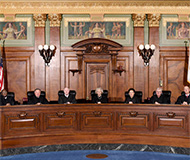11/24/2020
Illinois Supreme Court Confirms Existence Of Illegal Traffic Ticket QuotaSparta, Illinois, traffic ticket quota struck down as illegal by the state Supreme Court.

Many states have laws prohibiting government officials from imposing traffic ticket quotas on police officers, but they are routinely ignored. Localities are often able to achieve the goal of increasing ticket-writing activity without having the formal "quota" label for the revenue generating demands placed on police officers. On Thursday, the Illinois Supreme Court refused to play word games and struck down an "activity point" system as illegal.
The city of Sparta had thought in 2013 it could use the activity point label to get around the ticket quota ban, which outlaws the practice of requiring an officer to issue "a specific number of citations within a designated period." Officers on the day shift were required to rack up 82 "points" and night-shift officers needed to score 65 points, with a traffic ticket counted as two points, but a warning written to a motorist earning a single point.
"Failure to reach the minimum monthly points will result in discipline," the Sparta police policy explained. "Discipline will be corrective and progressive in nature."
The local police union, the Policemen's Benevolent Labor Committee, decided to file suit to protect officers from this policy. A circuit court judge rejected the idea that the point system was merely a traffic ticket quota in disguise. Officers could, in theory, meet the points target without issuing any tickets at all, the city argued. The high court justices did not buy that argument.
"The policy, at least indirectly, may compare police officers based on the number of citations issued because points are awarded for citations and officers are compared and receive awards based on points of contact," the high court ruled. "By granting awards based on points of contact, the policy may provide an incentive for officers to write citations to accumulate as many points as possible."
The court noted that the points system could still be used for other elements of the policeman's job -- just not the issuance of tickets.
"As we have found, the statute could not be clearer on the specific issue presented by this appeal, i.e., whether issuance of citations may be included as points of contact in the city's policy," the court concluded. "The statute simply cannot reasonably be read to permit municipalities to include the issuance of citations as points of contact."
A copy of the ruling is available in a 50k PDF file at the source link below.


